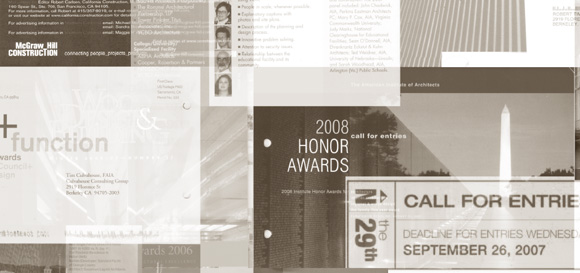Until recently, I had never won an award of any kind. So when I began my service in 1999 on the national board of directors of the AIA in the capacity of Public Director (non-architect), I was more than a bit nonplussed by the overwhelming attention paid to honors and awards. After all, surgeons, attorneys, professors, judges, and clergy don’t have award programs. Why does architecture?
More than 40 pages of the Almanac of Architecture & Design are given over to a listing of major awards and fellowships. That doesn’t even include the many local award programs. A conversation I had a decade ago with prominent architect Stanley Tigerman revealed he had already collected 110 awards. How many must he have now? Skidmore Owings & Merrill has more than 800. The superstars cannot even accept all they are offered. Needless to say, I found this obsession over awards to be puzzling, amusing, embarrassing, and, as a psychologist, somewhat disturbing, because I am aware of the research documenting their counterproductivity.
Now about that award I did win. By surprise, I was notified that my coauthor and I had won the McKinsey Award for having written what an independent panel judged to be the best article to appear in the Harvard Business Review that year. I didn’t even know such an award existed. I cannot imagine what it must be like to apply for an honor. My first reaction was to laugh, because the article was about success and failure and included a highly critical analysis of the practice of giving extrinsic rewards of any kind—honors, awards, even praise. I figured the judges couldn’t resist the irony.
Like many winners of awards, I thought about other reasons of that sort to explain how I might have won it. Since I had a terrific co-author in writer Ralph Keyes, who has written thirteen successful books, I figured having teamed with him might explain it. Then I saw the list of judges and noted that I was acquainted with one of them personally. Well, I thought, maybe that explains it. I’m sure that you readers who have won awards understand that process of discrediting oneself, because you know enough to know how awards are often judged and why they are given. In one ceremony, a major award winner, beset with such feelings, set fire to all of his awards. Another uses a major award as a toilet paper holder. Is there an architect who has never won an award? It seems they collect awards now the way batters number home runs—for their statistical significance.
Contrary to what most people believe, giving awards is not a benign activity. The weight of psychological research on this subject shows clearly that extrinsic rewards are ultimately demotivating, not just because there are always a lot more losers than winners, but because the pursuit of awards paradoxically distracts the person from the work itself. Genuine rewards, the kind that lead to further innovation, are always intrinsic to the process of the work. That’s why managers in all kinds of organizations are now trying to make work more interesting, rather than thinking up external rewards like trips to Cancun. In both industry and education, countless studies show that honors, awards, prizes, bonuses, A grades, gold stars, even praise, have negative consequences. Performance reviews are in the same category. Practically all evaluations and competitions have been shown to be similarly wrongheaded.
A major real estate developer once told me that he would never hire an award-winning architect. He wants the architect to be fully devoted to him and his project, without an eye to winning some prize from the profession. That’s why the leading advertising firm of Wells Rich Greene will not allow their employees to enter award competitions. It distracts them from their clients.
The litany against such award programs is long, beginning with the notorious jinx conferred by the Nobel. Winning that prize virtually guarantees that no work at that level will ever be done again by the winner. I feel lucky that I am in a field that does not offer the Nobel. I was once a guest at a roundtable conference of top scientists gathered at UCLA. At one point in the discussion, I could tell that the group was at an impasse. The scientist sitting next to me leaned over and whispered, “That woman across the table knows the answer to the question that is stopping us now, but she won’t tell us because she doesn’t want any of us to beat her to the Nobel.” So much for scientific communication. That’s how the Nobel really works.
You probably are aware that awards are less often given to mavericks, to those whose pioneering work really shape the field, or to women (unbelievably, Jane Jacobs was never even nominated for the AIA Gold Medal, and out of 63 winners, none are female). The politics of awards is an interesting, if somewhat appalling, field of study. There are no pure honors, not the Nobel, not any. All are confounded with politics, fashion, favoritism, orthodoxy, intrigue, hidden agendas. People get honorary doctorates instead of a fee to give a commencement address, prizes are intended to call attention to the organization more than the honoree, movie studios spend millions to win an Oscar, and so on.
A persuasive case can be made that architectural awards are good advertising for the profession. The award photos certainly do gain a lot of free display space in newspapers and magazines. But I think they also paint a picture of the profession to which most people cannot relate. They cannot imagine that those fabulous homes could ever be theirs. That may be part of the reason architects, according to Michael Benedikt, design only two percent of the custom buildings in America.
Award photos rarely identify the profession with solving the most pressing problems of shelter around the world, let alone other contributions architecture can make to reduce the indices of despair such as crime, mental and physical illness, addiction, school failure, divorce, and suicide. Consequently, the public does not often look to architecture for help in those areas. But architecture can really help, because it designs situations—not just buildings; and situations, as every psychologist knows, are the most powerful determinants of behavior: more powerful than personality, habit, education, character, and genetic makeup—more powerful than anything. That’s why I put so much of my hope for the future in the design professions. But it will take a different kind of communication with the public if they are going to support the profession of architecture with hundreds of billions, as they do education and medicine, which are not nearly as effective.
In conversations with architects, I have found that I am not alone in my opposition to honors and awards. Many are embarrassed, as I am, by the self-congratulatory nature of awards, and the time they take out of what could otherwise be productive meetings. I recall my experience as a keynote speaker at the 1998 AIA convention in San Francisco. The plenary session in which my talk was presumably the main event was scheduled to be an hour and a half long, ending with my forty-five minute speech, and “only a few awards to give first.” I was to be finished with my talk at 10:45. After all the awards had been given out, I was introduced at 10:40.
Awards are actually the enemies of innovation. If you want to delve into the negative effects of extrinsic rewards, there is a marvelous book by Alfie Kohn, Punished by Rewards, which summarizes the literature and makes the case rather compellingly. And, as we all know, the major innovations in any field are greeted with just the opposite of awards. They are first ridiculed, then treated with hostility, followed eventually by grudging acceptance. If you find my position on awards a bit difficult to embrace, you might be comforted to know that I also oppose most other well-accepted practices of the architecture and design professions, such as commoditization, protectionism, licensing, accreditation, fellowships, mandatory education, PAC contributions to politicians, internecine warfare attempting to deny other designers full professional standing, and so on. All of these practices, just like award programs, are meant to increase respect for architecture, but I believe they have just the opposite effect. None of them existed when architecture was in full flower.
What? Architects were once more influential than they are now? Indeed they were. Architects do not have the leadership status they once did when they were deeply involved in the high councils of decision making, creating institutions like the Union League Club, fighting slavery and advocating other causes, associating with presidents. Architect and ambassador Richard Swett has documented that history in his book, Leadership By Design. If architects are to enjoy that position again, one that would permit them to greatly influence the future of design, they need to regain that lost respect.
If we didn’t give out awards, just how should we motivate architects? Here my answer is even more radical. If you want to stimulate innovation, and the necessary risk taking it requires, treat success and failure the same way. Not with rewards or punishment, not even with evaluation, but by understanding and engagement—regarding every well intended failure as just another step on the road to achievement.
But what about losing the quasi-advertising function of awards? Not to worry. First of all, a building does not have to be “award winning” to be interesting or to be displayed in a magazine. But there are bigger fish to fry. This is the Design Century.
Architecture and the other design professions should be planning in the trillions. Let’s not forget that just showing beautiful buildings does not serve to educate the public on what could be architecture’s most important and most remunerative calling, its power to address the major problems of homelessness, slums, crime, illness, ethnic conflict, etc., that so cripple our global society, and to foster the creativity, cooperation, and affection necessary to help build a better world—a world I believe design can make possible.
Author Richard Farson, PhD, is a psychologist, author and educator. He is president of the Western Behavioral Sciences Institute in La Jolla, California, and director of its online think tank, the International Leadership Forum.
Opening collage by Ragina Johnson.
Originally published 3rd Quarter 2007, in arcCA 07.3, “Comparing Awards.”






